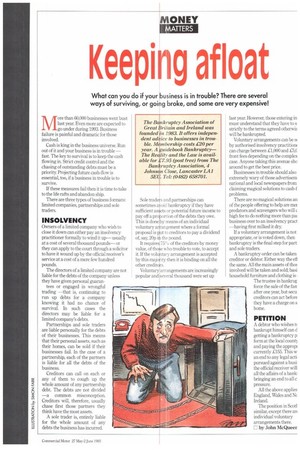Keeping afloat
Page 43

If you've noticed an error in this article please click here to report it so we can fix it.
What can you do if your business is in trouble? There are several ways of surviving, or going broke, and some are very expensive!
More than 60,000 businesses went bust last year. Even more are expected to go under during 1993. Business failure is painful and dramatic for those involved.
Cash is king in the business universe. Run out of it and your business is in trouble — fast. The key to survival is to keep the cash flowing in. Strict credit control and the chasing of outstanding debts must be a priority Projecting future cash-flow is essential, too, if a business in trouble is to survive.
If these measures fail then it is time to take to the life rafts and abandon ship.
There are three types of business formats: limited companies, partnerships and sole traders.
INSOLVENCY
Owners of a limited company who wish to close it down can either pay an insolvency practitioner formally to wind it up— usually at a cost of several thousand pounds— or they can apply to the court through a solicitor to have it wound up by the official receiver's service at a cost of a mere few hundred pounds.
The directors of a limited company are not liable for the debts of the company unless they have given personal guaran tees or engaged in wrongful trading —that is, continuing to run up debts for a company knowing it had no chance of survival. In such cases the directors may be liable for a limited company's debts.
Partnerships and sole trader:, are liable personally for the debts of their businesses. This means that their personal assets, such as their homes, can be sold if their businesses fail. In the case of a partnership, each of the partners is liable for all the debts of the business.
Creditors can call on each oi any of them to cough up the whole amount of any partnership debt. The debts are not divided —a common misconception. Creditors will, therefore, usually chase first those partners they think have the most assets.
A sole trader is, entirely liable for the whole amount of any debts the business has incurred. Sole traders and parmerships can sometimes avoid bankruptcy if they have sufficient asSets or potential future income to pay off a proportion of the debts they owe. This is done by means of an individual voluntary arrangement where a formal proposal is put to creditors to pay a dividend of, say, 20p in the pound.
It requires 75" of the creditors by money value, of those who trouble to vote, to accept it. If the voluntary arrangement is accepted by this majority then it is binding on all the other creditors.
Voluntary arrangements are increasingly popular and several thousand were set up last year. However, those entering in must understand that they have to s strictly to the terms agreed othenvis will be bankrupted.
Voluntary arrangements can be s( by authorised insolvency practitiom can charge between £1,000 and £5,C front fees depending on the complex case. Anyone taking this avenue she around to get the best price.
Businesses in trouble should also extremely wary of those advertisem national and local newspapers from claiming magical solutions to cash-f problems.
There are no magical solutions an of the people offering to help are met predators and scavengers who will (. high fee to do nothing more than pat business over to an insolvency pract —having first milked it dry.
If a voluntary arrangement is not appropriate, or is voted down, then bankruptcy is the final step for part and sole traders.
A bankruptcy order can be taken creditor or debtor. Either way the efi the same. All the main assets of thoF involved will be taken and sold; basi household furniture and clothing is , The trustee in bankrt4 force the sale of the fan after one year, but secu creditors can act before they have a charge on s home.
PETITION A debtor who wishes n bankrupt himself can d getting a bankruptcy p form at the local count and paying the appropi currently £155. This w an end to any legal acti, pursued against a busi: the official receiver will all the affairs of a bank] bringing an end to all c pressure.
All the above applies_ England, Wales and Nc Ireland.
The position in Scotl similar, except there an individual voluntary arrangements there.
by John McQueer




















































































